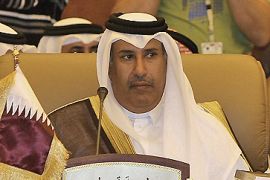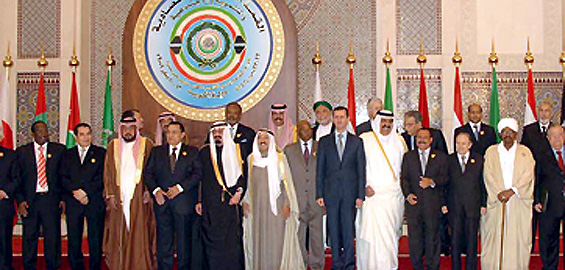Arab rifts challenge Doha summit
Dubbed a “Reconciliation Summit’ the Arab League meeting begins amid deep divisions.

 |
Initially dubbed a “reconciliation summit’, the Arab League meeting in Qatar instead showcased Arab differences before it even started.
The rift among Arab states between the so-called “rejectionist” and “moderate camps”, mostly brought on by the campaign by George Bush, the former US president, to mobilise Sunni Arab governments against Iran, has produced new rivalries that have gained a momentum of their own.
But also underlying the disputes are differences between Qatar and Egypt, highlighted by the decision by Hosni Mubarak, the Egyptian president, not to attend the summit.
The division is not only the usual Arab competition about who is the major power broker in the Arab World, but also Egypt’s fear that Qatari policies could boost perceived attempts by Iran to fill the void left by the absence of a strong Arab leadership in terms of influencing policies of the region.
Traditionally Egypt, with its large population and weight in leading intellectual and political pan-Arab nationalism, as well as its long history (as opposed to new Arab nation-states) had resisted Saudi Arabia’s efforts, fuelled by petro-dollar wealth, to rob Cairo of its revered place.
Qatar, a tiny country and newcomer, has upstaged its larger Arab siblings in taking centre-stage as a power broker in countries and conflicts ranging from Yemen, Lebanon, Sudan and Somalia.
It has increased its profile through involvement in internal Palestinian politics as well as in the Israeli-Arab issue, mainly through its support for the Hamas movement.
Growing suspicion
But Doha is not seen as a competitor by Egypt, even though the Egyptian press maintains its criticism of Qatar “inflating its political size beyond its natural weight and abilities”.
| In depth |
|
|
What seems to have irked Cairo more are Doha’s ties with Tehran and its increased role in Palestinian affairs.
Egypt’s suspicions became more pronounced at the Doha emergency summit in January following Israel’s war on Gaza, when both Ahmadi Najad, the Iranian president, and Khaled Meshaal, the Hamas leader, were invited to assert their role and offer their views.
Their presence at the summit did not only irritate the Palestinian Authority, which feared it was an endorsement of a potentially Iranian-backed plan to find alternative Palestinian leaders, but also raised concerns in Cairo and other Arab capitals that the move could open the door to Iran to quell the idea of, or even replace, an Arab leadership.
Saudi Arabia later sought to initiate reconciliation between “the two camps”, partly to reassert its role, but also to curtail further “Iranian interference”.
It convened a meeting in Syria, Egypt and Kuwait and a mini-summit in Riyadh, but ended up deepening the divide between the Egyptians and the Qataris, who were not invited to the Saudi capital.
‘Smear and undermine’
The Riyadh meeting further dashed hopes of a broader reconciliation especially, according to Arab diplomats, as it was believed that Egypt vetoed inviting Doha, a claim Qatar believes to be true.
By then Egypt was convinced that Qatar, through the reporting and analysis broadcast by its Al Jazeera news channel, was launching a deliberate campaign “to smear and undermine Egypt’s Arab role”.
Critics of Egyptian policies argue that it was Cairo’s closure of the Rafah crossing with Gaza, which some saw as paramount to complicity with the Israeli siege of the coastal strip, that angered Arab nations, generating a negative image of the country.
Cairo was also agitated by what it saw as Doha’s role in undercutting Egyptian sponsoring of reconciliation between Hamas and the Palestine Liberation Organisation’s groups, especially the Fatah movement led by Palestinian President Mahmoud Abbas.
So it was no surprise that Hosni Mubarak, Egypt’s president, would decide not to attend the Doha summit, with Saudi Arabian and Libyan mediators failing to heal the deepening rift.
While the boycott of the emergency summit in Doha in January was interpreted as a result of US pressures on Egyptian, Jordanian, Saudi Arabian and other leaders, then classified as part of the so-called ” moderate Arab camp”, it has not been raised as a reason to explain the absence of mostly the same leaders from the Doha summit.
While Hilary Clinton, the US secretary of state, kept up the pressure on Tehran and seemed keen on mobilising support against it, US President Barack Obama’s overtures to Iranian leaders has eased the pressure on Arab leaders to conform to Washington’s demands.
Some Arab leaders remain wary of the rising Iranian influence.
Successful balance
The Palestinian Authority believes that Tehran is interested in controlling the Palestinian issue, through its support of Hamas, in an attempt to emerge as the main power broker in the region.
| In depth |
|
|
Despite the shift in the US attitude towards Iran and Syria, the role of Iran and the US remain pivotal to determining inter-Arab alliances.
The new American administration, in the view of many Arab officials, has shifted tactics, but not its goal, in isolating or “taming” Iran and Syria.
Doha distinguished itself by its ability to maintain ties with both Iran and Washington.
Nevertheless, Qatar cannot afford to shift so far as to alienate its relations with the US.
Some analysts believe that Doha’s decision not to invite Iranian and Hamas leaders to the summit was not only prompted by its desire to ensure high attendance of Arab leaders, but also to maintain its ability to successfully balance and adapt to new regional and international developments.
The so-called “moderate camp” has also started to soften its position, at least in the way it chooses to counter what it views as “the Iranian threat”, as it adapts to the Obama policy of engagement and dialogue mainly with Tehran, but also Syria.
Jordan’s King Abdullah, according to Jordanian official sources, was planning to attend the summit but considered cancelling after Al Jazeera aired two programmes in which prominent Egyptian journalists and author Mohamad Hassanein Haikal launched scathing attacks against the ruling Hashemite family.
Serious discussion
Officials in Jordan were puzzled, according to the same sources, about whether it was simply part of Al Jazeera’s own journalistic endeavour or if it reflected a signal by Qatar that it was no longer interested in maintaining its recent and fragile reconciliation with Amman.
Al Jazeera offered Jordan an opportunity to counter Haikal’s accusations in an interview with the speaker from the senate and Zaid Al Rifai, the former prime minister.
Jordan’s king Abdullah then confirmed his participation at the meeting.
But as Arab leaders convene another Arab summit, personal and political differences and the underlying continued rivalry between Iran and the US, have so far eclipsed serious discussion on a strategy to counter, what all Arabs leaders seem to agree is, the waning Middle East “peace process”.
During the closed preparatory sessions, the Arab foreign ministers initially agreed to renew commitment to the Arab Peace Initiative, but also reaffirmed a previous threat that the proposal could be withdrawn if the Israeli policies of expansion and siege of the Palestinian lands and people continue.
The Palestinian Authority protested, arguing that the reiteration of previous positions on the initiative did not constitute a policy of action and demanded an Arab strategy to effectively counter what it sees as an “escalation of Israeli aggression”.
While the Palestinian leadership is concerned with Iran’s increased role in Palestinian affairs, they cannot afford to let the perceived Iranian “threat” overshadow the conflict with Israel.
The ministers agreed to form a committee to devise an Arab plan of action to deal with the Israeli expansion of settlements and to increase international pressure on its leaders to lift the siege on Gaza.
But considering that Arab differences will still prevail, it will be a surprise if Arab participants emerge with more than promises and words to present a clear vision of the Arab view of ” the peace process” or countering the rise of the political right-wing in Israel.

 Sadat’s peace gambit
Sadat’s peace gambit